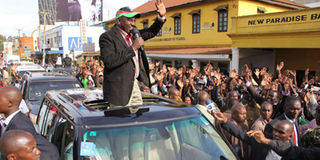How Ruto rose from poverty to deputy president

PHOTO | JARED NYATAYA Deputy President-elect William Ruto addresses members of the public on Uganda Road in Eldoret town on March 23, 2013.
When the guru of African literature, Chinua Achebe, sought to explain the unbelievable rise of Okonkwo in Things Fall Apart, he went to the basics of life to drive home his point.
He wrote: “Looking at a king’s mouth, one would think he never sucked at his mother’s breast.”
That was in 1966, the same year, on December 21, when a boy was born in Kamagut village, Uasin Gishu who will come to relive the epic rise of Okonkwo — from a life of poverty and misfortune — to Kenya’s Deputy President.
It has taken shrewdness, hard work and a high ambition for Deputy President-elect William Ruto to become the second man in charge of the country.
The deputy President-elect’s family was so humble that the young Ruto at one time sold peanuts on the Eldoret-Malaba highway to supplement the income of his parents — Daniel and Sarah Cheruiyot. His father has since died.
Moi factor
Mr Ruto found his way to national politics through the Youth for Kanu ‘92 group which successfully campaigned for the re-election of then President Moi in the face of the opposition during the first multiparty elections. The group was chaired by former Lugari MP Cyrus Jirongo.
After the polls, Mr Ruto went into business until 1997 when he contested and won the Eldoret North seat.
In Parliament, Mr Ruto joined forces with Mr Jirongo and Kipruto Kirwa of Cherengany to criticise Mr Moi’s government.
But Ruto later mended fences with the Moi establishment and was appointed assistant minister for Provincial Administration before joining the Cabinet in 2002.
Ruto chose to stick with Mr Kenyatta in the December 2002 election in which they lost to National Rainbow Coalition’s Mwai Kibaki. Amani presidential candidate Musalia Mudavadi was Mr Kenyatta’s running mate.
During Mr Kibaki’s regime, Mr Ruto joined forces with disgruntled elements in Mr Odinga’s camp to defeat the 2005 constitutional referendum. It was after the victory that the Orange Democratic Movement (ODM) was born. In 2007 Mr Ruto supported Mr Odinga for the presidency.
ODM, led by Mr Odinga and with Mr Ruto playing a key role, was to be a major party in the fiercely contested 2007 elections that sparked violence for which the International Criminal Court is investigating the Eldoret North MP.
After the 2007 elections, Mr Ruto was named minister for Agriculture and weathered a storm in the ministry in 2009 when he was accused by the Parliamentary Accounts Committee of involvement in maize scandal.
Mau evictions
Combined with his position over the Mau Forest evictions, he was on April 21 2010, transferred from the Agriculture ministry, and taken to Higher Education.
His woes magnified when, on August 24, 2011, he was dismissed from the Cabinet and went to the back bench. He led a team of Kalenjin MPs from ODM including majority MPs from pastoralist communities and the Coast region to revive the United Democratic Movement (UDM) as his vehicle for the presidency.
When wrangles set in UDM, Mr Ruto moved with his team to found the United Republican Party (URP) and popularised it as its presidential candidate until October 2012 when he teamed up with Mr Kenyatta to form the Jubilee Alliance which won the March 4, 2013 elections.




